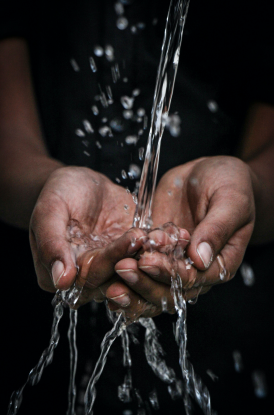Adoption Ceremonies
For Sunday, 10 January 2021: Mark 1:4-11
4 John the baptizer appeared in the wilderness, proclaiming a baptism of repentance for the forgiveness of sins. 5 And people from the whole Judean countryside and all the people of Jerusalem were going out to him, and were baptized by him in the river Jordan, confessing their sins. 6 Now John was clothed with camel’s hair, with a leather belt around his waist, and he ate locusts and wild honey. 7 He proclaimed, “The one who is more powerful than I is coming after me; I am not worthy to stoop down and untie the thong of his sandals. 8 I have baptized you with water; but he will baptize you with the Holy Spirit.”

9 In those days Jesus came from Nazareth of Galilee and was baptized by John in the Jordan. 10 And just as he was coming up out of the water, he saw the heavens torn apart and the Spirit descending like a dove on him. 11 And a voice came from heaven, “You are my Son, the Beloved; with you I am well pleased.”
“Regard Heaven as your father, Earth as your mother and all things as your brothers and sisters” is a Native American proverb common to several tribes. In today’s gospel reading, the Father’s voice is heard from heaven as the beloved son Jesus emerges from a symbolic birth through the waters of the earth. Jesus is proclaimed as the beloved son who brings God much pleasure. Traditional Christian teaching is that Jesus is uniquely God’s only begotten son, but that as we are joined to him through repentance and faith in the waters of baptism we are adopted as God’s sons and daughters and become siblings of Jesus.
Adoption ceremonies have been observed by Native people of all nations to strengthen their circles of family, clan, and tribe. For example, the Wyandot people who lived on the shores of Lake Ontario in the fifteenth century and today are in Oklahoma and Quebec, had a special procedure for adoptions. The decision to adopt an outsider was made by the matriarch of the family. The adoption was not complete, however, until it was ratified by the clan chief when the adoptee was given a new name and officially welcomed as a member of the tribe.
For Christians, the sacrament of baptism is our adoption ceremony. Through baptism we become adopted sisters and brothers of Christ and members of a new family comprised of people from every tribe, nation, language, and race. Cyprian, a bishop of the third century in North Africa, declared that in the Christian family, God is our father and the Church is our mother. Baptismal fonts came to be understood as “wombs” where new Christians were born again into a new life and family.
This theme of adoption is also evident in Scripture: “When the fullness of time had come, God sent his Son, born of a woman, born under the law, in order to redeem those who were under the law, so that we might receive adoption as children. And because you are children, God has sent the Spirit of his Son into our hearts, crying, “Abba! Father!” So you are no longer a slave but a son or daughter, and if a son or daughter then also an heir, through God” (Galatians 4:4-7).
Membership into an adoptive family carries with it certain privileges and responsibilities. Among the privileges as heirs are “union with Christ in his death and resurrection, birth into God’s family the Church, forgiveness of sins, and new life in the Holy Spirit” (BCP, p. 858). Among the responsibilities are “continuing in the apostles’ teaching and fellowship, in the breaking of bread, and in the prayers” and “perseverance in resisting evil, and whenever we fall into sin, repentance and return to the Lord” and “proclamation by word and example of the Good News of God in Christ” and “the search and service of Christ in all persons, loving our neighbors as ourselves” and “striving for justice and peace among all people, and respecting the dignity of every human being” (BCP, p. 304-5).
We also are beloved! May our lives bring as much pleasure to God the Father as does that of our eldest brother, Jesus.

